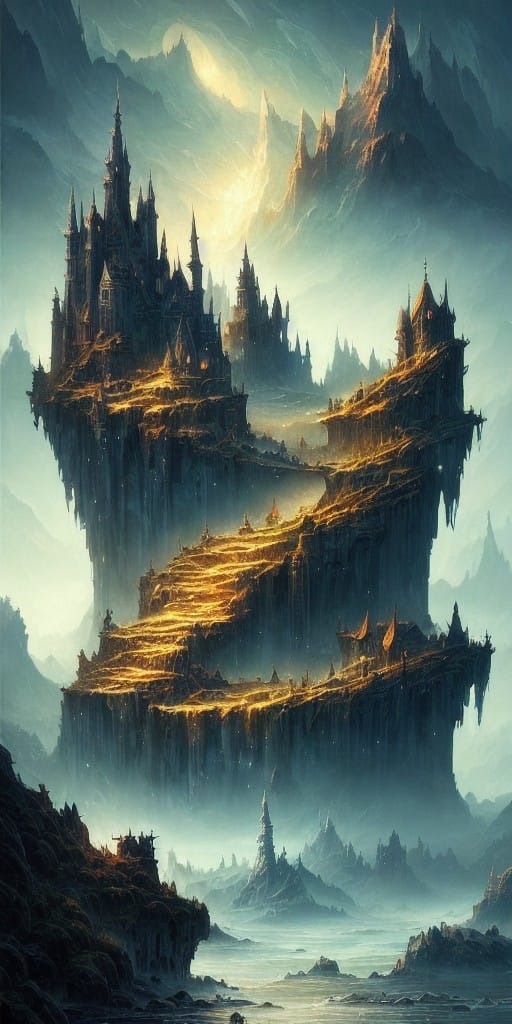When we think of fantasy, especially epic fantasy, we conjure images of imaginary worlds, creatures, species, magic, etc. All this is part of world building which is a crucial aspect of fantasy writing. It sets the stage for your story and immerses readers in a unique and captivating environment. The following are some guides which I have personally noted during the creation of some of the realms in “Guardian: Rise of the Gods”, that can help you build a rich and fantastic world:
1. The Geography:
Landscapes: Create diverse landscapes, which include mountains, forests, deserts, and oceans. Consider how geography influences the climate, the people, and resources of different regions.
2. Establish the History:
Timeline: Develop a timeline of major historical events that have shaped your world. This provides depth and context for the current state of that realm.
Civilisations and Empires: Outline past and present civilisations, their rise and fall, and the impact they had on the world and its peoples.
3. Cultural Diversity:
Languages: Create your own languages or dialects for different races or regions. You do not have to create entire languages, but having certain phrases or naming patterns can add authenticity. It can also be a fun part of the world building process, even getting to understand the people and customs a little more.
Customs and Traditions: Define unique customs, rituals, and traditions that distinguish various cultures within your world.
4. Political Systems:
Governments: Determine the types of governments that exist, whether there are monarchies, democracies, or even something entirely different that you can create. What kind of system would you like to see in place?
Power Structures: Identify the power structures and relationships between different factions, organisations, or ruling bodies. Rarely you will find a utopian society and even then, there are still disagreements.
5. Magic System:
Rules of Magic: Establish clear rules for how magic works in your world. Consider the source of magic, its limitations, and the consequences of its use. Limitations are important, as otherwise the power becomes absolute. Even superheroes have limitations.
Types of Magic: Define different types of magic or magical abilities that characters may possess. Do they contribute to the world or are they just a normal part of life?
6. Creatures and Plant Life:
Unique Creatures: Populate your world with fantastical creatures, whether they are mythical beasts, magical creatures, or entirely original creations. This is your creation, put in what you think would suit its environment.
Plant Life: Include unique plant life and how it may have magical or practical uses in your world, even healing properties.
7. Economy and Trade:
Currency: Create a system of currency that fits the world. Consider whether there are multiple currencies or a universal one. How important is currency to your world?
Trade Routes: Identify key trade routes and economic hubs. How do different regions trade with each other? What are the main cities? Life around these hubs might differ from other parts of the world.
8. Technology and Innovation:
Technological Level: Determine the level of technology in your world. Is it medieval, steampunk, futuristic, or create your own blend of what it might be.
Innovations: Introduce unique inventions or technological advancements that shape your world.
9. Religions and Belief Systems:
Pantheon: Develop a pantheon of gods or spiritual entities. Explore how different cultures interpret and worship these beings. What are the belief systems of the people, and do everyone follow the same beliefs?
Religious Practices: Define rituals, ceremonies, and religious practices that are integral to the cultures in your world.
10. Social Structure:
Class Systems: Explore social classes and hierarchies within your world. How does one's social status affect their opportunities and challenges? Does it hinder them from progressing within their world or give them great opportunities?
Roles and Occupations: Define common occupations and roles within different societies.
11. Conflict and Alliances:
Historical Conflicts: Identify past wars, conflicts, and alliances that have shaped the geopolitical landscape. What remnants of those still exist?
Current Tensions: Explore existing tensions between nations, races, or factions that may have an important part in your story plot. How relevant is it?
12. Day-to-Day Life:
Daily Routines: Describe the daily lives of the inhabitants. What do people eat, wear, and do for leisure?
Housing: Design architectural styles and housing structures based on the cultural and environmental influences. Do keep in mind the nature of the world and its natural resources, its production capability or skill of the people, in deciding what kind of houses or buildings could be built.
13. Seasons and Weather:
Climate: Develop a climate for your world. How do seasons affect different regions, and what impact does that have on the inhabitants?
14. Unique Features:
Mystical Locations: Introduce mystical or legendary locations that hold significance in your world.
Artifacts and Relics: Create powerful artifacts or relics with unique histories and abilities.
15. Hidden Secrets:
Mysteries: Include hidden or undiscovered elements in your world, waiting to be explored by your characters.
16. Reader's View:
Reveal Gradually: Like with different aspects of novel writing, introduce your world gradually and at points in the story, when necessary, otherwise it will overwhelm readers with information dumping. Let them discover the intricacies of your world through the characters' experiences.
Remember that research is also very important and you are creating a world that feels authentic. Consistency in the rules of your world is crucial for maintaining believability. Whether your world is vast and intricate or small and focused, make sure it complements the themes and tone of your story. So, start world-building and explore all the possibilities!





Thanks Ben, that was both informative and interesting.